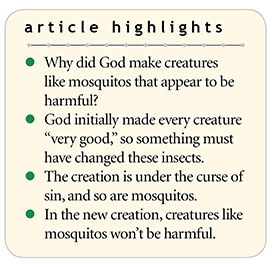 My wife and I enjoy evening walks with our dog when the Texas weather lets us. Unfortunately, mosquitos seem to like good weather too. And they recognize my wife is much sweeter than I am. She often asks, while swatting at them, why God made mosquitos. Usually the question is just a way to express her frustration over getting bit. She has my sympathy. My attempts to explain go something like this.
My wife and I enjoy evening walks with our dog when the Texas weather lets us. Unfortunately, mosquitos seem to like good weather too. And they recognize my wife is much sweeter than I am. She often asks, while swatting at them, why God made mosquitos. Usually the question is just a way to express her frustration over getting bit. She has my sympathy. My attempts to explain go something like this.
The first mosquitos God made didn’t seek to suck blood. Nor did He make their piercing-sucking mouthparts to transmit deadly diseases like yellow fever or malaria. We know this from Genesis 1:31: “Then God saw everything that He had made, and indeed it was very good.” Ask my wife if she thinks mosquito bites are good and she’ll give you a side-eye glance. Say that they are very good and she may suggest you take a drug test. Mosquitos annoy, but the diseases they transmit can kill. So, something happened to turn those originally “very good” insects into the flying mini-vampires that terrorize us today.
The apostle Paul wrote, “We know that the whole creation groans and labors with birth pangs together until now,”1 and mosquitos are part of this whole creation. You could ask my wife about birth pangs. She delivered five babies with no anesthesia. One penalty of sin was pain in childbirth, according to Genesis 3. God told Eve, “In pain you shall bring forth children.”2 Paul likens the groans, labors, and pangs throughout the whole world to a mother’s birth pangs.
Those labors feel miserable, but they bring forth new life and new joy. Birth pangs wrack mothers’ whole bodies, but each one signals something better lies ahead. The momentary groans in this life point to an everlasting world God has promised He will remake. “‘For as the new heavens and the new earth which I will make shall remain before Me,’ says the LORD, ‘So shall your descendants and your name remain.’”3 God allowed mosquitos to fall from perfection—like so many other current pests, poisons, parasites, and problems—so they would remind us that this well-crafted but breaking-down “creation eagerly waits for the revealing of the sons of God.”4 This present cursed world is not the ultimate home for Christ-followers. We should invest elsewhere.
So, what purpose did mosquitos serve before they started misbehaving after the Genesis 3 curse? Nobody knows for sure since we can’t go back to Eden and find out. But many mosquito species use their unique mouthparts to take nectar from flowers or fruit. Of the 3,500 or so named mosquito species, only a few hundred harangue humans. Perhaps all of them took nectar meals in the beginning.
Even in today’s disease-wracked creation, mosquitos supply a link in many food chains. Their aquatic larvae filter and clean cloudy water. Their wiggly bodies feed fish, tadpoles, and dragonfly nymphs. Birds, bats, and spiders eat the adults. Plus, the majority of the species that dine on nectar also pollinates plants.
Rest assured, one day “they shall not hurt nor destroy in all My holy mountain, for the earth shall be full of the knowledge of the LORD as the waters cover the sea.”5 So, the next time a pesky mosquito pierces your pelt, let it remind you that “both the earth and the works that are in it will be burned up”6 to make way for a new earth without misbehaving mosquitos. If God makes mosquitos for the new earth, they will only remind believers of the Lord’s genius. Any mosquitos in that day will give us cause to praise during pleasant evening walks.
References
- Romans 8:22.
- Genesis 3:16.
- Isaiah 66:22.
- Romans 8:19.
- Isaiah 11:9.
- 2 Peter 3:10.
* Dr. Thomas is Research Associate at the Institute for Creation Research and earned his Ph.D. in paleobiochemistry from the University of Liverpool.



















